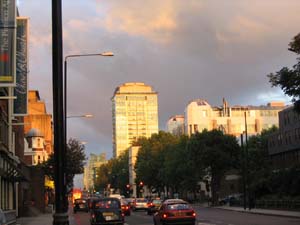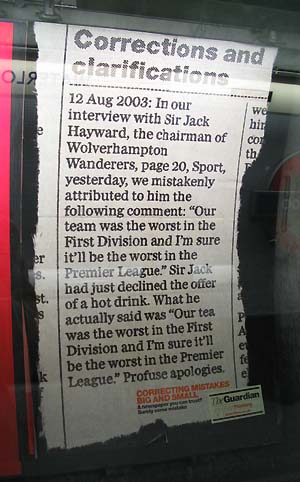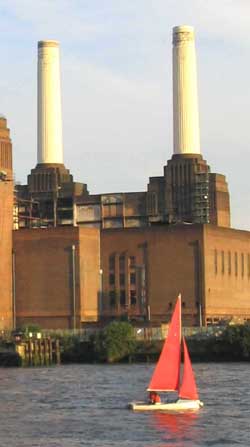We are developing the social individualist meta-context for the future. From the very serious to the extremely frivolous... lets see what is on the mind of the Samizdata people.
Samizdata, derived from Samizdat /n. - a system of clandestine publication of banned literature in the USSR [Russ.,= self-publishing house]
|
Surprise, surprise:
President Robert Mugabe’s rosy forecast of a bumper harvest in Zimbabwe was contradicted by his own government yesterday, when an official report said 2.3 million people needed immediate international food aid.
The seizure of white-owned farms has combined with drought to cripple agriculture in Zimbabwe. But Mr Mugabe’s official message is that his land grab has markedly increased production and made Zimbabwe self-sufficient. Last month, he refused help from the United Nations World Food Programme, saying: “Why foist this food upon us? We don’t want to be choked.”
He brushed aside the fact that Zimbabwe has lived on food aid since 2001 and that 6.5 million people, more than half the population, depended on international help last year. By contrast, his office forecast a maize crop for this year of 2.4 million tons, more than enough to meet domestic needs.
Yet a report from the Zimbabwe Vulnerability Assessment Committee provides a strong antidote to the president’s optimism. It concludes that 2.3 million people in rural Zimbabwe “will not be able to meet their minimum cereal needs during the 2004/05 season”.
The report adds that food aid “for the most vulnerable people” should be sought immediately. The UN, aid agencies and Zimbabwean government departments compiled the assessment based on a survey completed in April. Mr Mugabe’s officials appear not to share his optimism.
Food aid be damned. Someone should invade the place. Almost anyone would now be an improvement. Handing food aid over to the existing regime will not feed the “most vulnerable”. It will merely feed the existing regime, and allow them to shove some more people into the most vulnerable category.
The big news in the London architecture scene just now is the fact that Ken Shuttleworth has left Norman Foster and is branching out on his own, with a new practice called simply: Make. And Make are making a huge public splash already, with this:
The Vortex, it is already being called.
“Ken Shuttleworth”, I realise, sounds like one of the barmier characters in The League of Gentlemen – but believe me, if you know who this guy is you soon forget that. He was the creative brain behind the Erotic Gherkin. He was also the creative brain behind the Millenium Bridge, the one which so famously wobbled when it was first opened. But the wobbles have been long fixed, and that, like the Gherkin, is now an instant London landmark, with the view of it from Tate Modern with St Pauls in the background now being a favourite London picture postcard.
Just as the Gherkin could have, the Vortex could end up looking horribly kitsch, like a giant lamp fit only for a car boot sale. But I hope and trust that, if Shuttleworth does get it built, he executes it as well as he executed the Gherkin, which all of London (that I know of) reckons is superb.
The design rationale of The Vortex is twofold. First, although the shape is beautifully curvy, it is a shape made entirely out of straight lines, which makes it a whole lot easier to build than it looks. Not easy mind, just easier. And second, the big rents in buildings like this are charged at the bottom and at the top, apparently, so the logical shape for such a beast to be is thick and bottom, thick and the top and thinner in the middle. The Vortex obliges perfectly, and as an intrinsic result of its shape.
But the most interesting thing of all about this building, to my way of thinking, is the fact that Shuttleworth has designed it, and announced it, before he knows where it will go.
This is fascinating. Design the building, in rough outline. Then advertise it. Then get the money together and get the politicians excited, and sort out where to put the thing. This makes perfect sense. It also flies in the face of much architectural orthodoxy about how the building has to blend into its surroundings, which I rather like. Because this thing will, if done well (Shuttleworth style), blend in with anything.
No doubt there will be Americans commenting here to the effect that edifices like this spoil Disneyland-London, which exists entirely for their amusement by being the opposite of New York and Chicago. They should know that I vehemently disagree. The business of London is business and it always has been, and you can’t do business only in cutesy little historical type buildings. London is a living city, and plans like this are all part of why it is living particularly vivaciously just now.
The idea is, of course, that the Vortex should be built in London. But since they haven’t fixed on a particular place for it yet, there is no reason why it couldn’t be built in Shanghai instead, or in Shanghai as well, and bigger. I could live with that.
The evening sun that illuminated one of my favourite views near where I live was especially dramatic this evening. And this little photo of how things looked is surprisingly effective I think. Even the little thumbnails I got I scrolled through all the pictures in Photoshop to choose a good one looked rather impressive.
But if you would like to see this rather bigger, then click on it.
I suppose there are some readers of this blog who will say, when confronted by images like this: what has this got to do with blah-blah-blah-ism (or whatever word they choose to give to the political assumptions and axioms we tend to favour here)? But, even though many readers may be puzzled, the fact is that our standing orders here are to write about what is on our minds. And what was on my mind when I went shopping earlier this evening was not the EU or the level of taxation or the importance of consenting relationships. It was how beautiful that usually quite mundane building over towards the river can look when it catches the evening sun just so, and especially when the sky behind it is also doing dramatic things of its own.
This kind of thing does make me want to have a more expensive camera, though, plus some lessons in how to use it. Because what my cheap little camera shows you is only a pale shadow of what I myself saw.
We have a posting category called “How very odd!”. Now I want one for “How very beautiful!” Meanwhile, “Architecture” will have to do.
I recommend this article about the Organization for Economic Cooperation and Development (OECD).
It reminds us here, if any of us need reminding, that even if we do manage to shake our country loose from the EU, there is still a ghastly alphabet soup of international organisations lying in wait for us.
Representing mostly high-tax European nations, the OECD thinks it is unfair when jobs and investment move from high-tax to low-tax nations. The bureaucrats are particularly upset that so-called tax havens provide a refuge for oppressed taxpayers from welfare states like France, Germany, and Sweden. As part of its anti-tax competition project, the OECD met in Berlin for a two-day conference during the first week of this month, hoping to bully tax havens into helping high-tax nations track and tax flight capital.
Using various threats, the OECD is pushing low-tax countries into providing information about nonresident investors to foreign tax authorities, meaning that any benefit of investing elsewhere disappears once European tax collectors can impose taxes on money invested outside their borders.
Acting as the Gambino family of the tax world, the OECD has pressured places like Anguilla and Panama to sign “commitment letters” pledging to participate in something called “information exchange” – an odd term for a one-way flow of data from “tax havens” to high-tax governments.
The writer of this, Joel Mowbray, focuses on the US contribution of $50 million per annum to this evil enterprise. But what this makes me think of is the fact that, following their recent electoral success, Britain’s UKIP is now being challenged by its enemies to work out some other policies, besides merely saying a big NO to the EU. And I say to such challengers, be careful what you wish for.
Here is a poster I snapped in the London Underground the other day, through the Jubilee Line glass screen at Waterloo. It is quite amusing, but should they really be boasting about things like this?
And look down at the bottom. Is this a conclusion they really ought to be proud to be drawing? Or is the implication that if they ever do make any mistakes, they are all just typos?
Detail of the bottom corner, with a bit of help from Photoshop to make it more readable:
So, may we now expect a poster with a big mistake corrected?
We have been supporting state centralised socialistic stupidity and stagnation for, you know, a long time. We were wrong. Sorry and all that. Capitalism has its problems, but it is, we now realise, much better.
DifferentNow guardian.co.uk
Such will not, I suspect, be the substance of my next posting here.
Yesterday afternoon, I visited my mother, and elder brother Toby also dropped by. He was a UKIP local council candidate in the recent elections, and did quite well, that is to say about as well as UKIP candidates did in the rest of the non-London southern part of England.
He said a number of interesting things, interesting to me anyway. He said that the EU’s accounts have not been audited for a decade (i.e. it is a criminal gang, financially speaking). He said that when canvassing, you do not waste time by arguing. You just say you are from UKIP and say please vote for us, and leave it at that. (Talk about their flowers.) He said that Kilroy had helped UKIP a lot. He said that UKIP had done well in a great doughnut, so to speak, of places which are not London itself, but which are all around London – the South East, the South West, the Midlands, East Anglia. He said that UKIP people and Conservative people get along really well with each other, and that the Conservatives often now talk and behave as if they and UKIP are on the same side, which for all practical purposes most Conservative activists are. (UKIP gives them a stick to beat their leaders with, and an exit if their beating up of their leaders gets nowhere.)
I found all this pretty interesting, although maybe this was because he is my brother, and we have always got on well, and also because I do not now read the newspapers as avidly as I might, every day.
But the most interesting thing Toby said concerned UKIP’s money. UKIP has, he said, a lot of money. → Continue reading: Why Toby Micklethwait is so optimistic about UKIP
… and leading directly on from how the state uses cameras to mess people around, here is another story (from the same source – top right column again – June 3rd) about a capitalist-supplied camera that helps motorists, and also anyone they might otherwise fail to notice and drive into.
Simply, on the very front of the car, some capitalists have attached a camera that can see sideways in both directions. Inside the car, there is a screen showing the (two) results to the grateful driver.
At the home where I grew up, and where my mum still lives, driving out past those high hedges and that high wall and across that very narrow pavement into the road was and is still a perpetual worry, with much craning of the neck forwards and asking of any front seat passenger to help by doing likewise. I do not use a car now, but when I did, I used constantly to think how handy such a camera would have been. Well, if I ever get another car, I may be able to have just such a camera on it.
Apparently these gadgets are already very big (metaphorically speaking – they are of course literally tiny) in Japan, where they were first devised and have first been made available. Japan is a land, I would guess, with many awkward little corners and hard-to-negotiate exits. As is ours.
The state is not your friend. Business has to be, or it goes out of business.
Patrick Crozier’s Transport Blog has a valuable service at the top right of the blog, in the form of links to transport related articles. (Most of the media do not seem to have a special category for “transport” stories, the way they do for “education” or “arts”.) Patrick adds very little in the way of accompanying commentary to these links, but others can comment, and on this story, several people did. I missed this when it first came out, but it seems to me worth making a fuss of, even if belatedly:
A pensioner who warned motorists of a police speed trap was convicted of wilfully obstructing a constable in the execution of his duty, banned from driving and ordered to pay £364 costs yesterday.
Stuart Harding, 71, was attempting to slow motorists down as they approached a Sunday morning car boot sale where many people were crossing the road.
Noticing that police were parked nearby with an officer using a hand-held laser speed camera, he decided that a warning stating “Speed Trap – 300 yards ahead” would be the most effective way of getting drivers to reduce their speed. But as soon as the officers noticed his placard he was cautioned for committing an offence.
And there seems little doubt that it was this sign that was the “offence”.
Robert Manley, prosecuting, said: “In displaying this sign the defendant was giving motorists advanced warning of a road safety camera being operated by the police 300 yards further along the road.”
The supposed idea of speed cameras is to dissuade people from breaking the speed limit. Mr Harding was also dissuading people from breaking the speed limit. Yet this is something that a prosecutor considers it proper to denounce Mr Harding for doing. And what is more, the court agreed.
I suppose you could just about argue that if we were all allowed to put up signs about speed cameras, we would all be at it, and we would all accordingly only have to obey the speed limit where there was a warning sign, instead of all the time as we should.
But I prefer Andy Wood’s explanation, which he links back to in his comment on this story. The income from speed cameras goes to local police forces, and they use cameras, and place their cameras in the first place, to raise revenue rather than to dissuade dangerous driving, the problem with dissuasion being that if it succeeds they get no money out of it.
So, watch out. If someone is committing an offence for which he is liable to be fined, do not, whatever you do, try to dissuade him. You will be “wilfully obstructing” the police in their attempts to fleece us of our money whenever they can.
I suppose the next question is: would it be wrong to encourage people to commit such offences? Would the police have any objections to that? Presumably not.
More seriously, this illustrates the general principle nowadays, that the state would rather tax and torment and generally mess with law-abiding, and even, as in this case, actively law-upholding citizens, rather than go after real criminals. Criminals are just too much bother to deal with. Moral: be a criminal. Seriously. The government is always jabbering away about how this or that measure might “send the wrong message” – usually what they say is that if they do not forbit some harmless and utterly unaggressive thing they might be interpreted as encouraging it. Well, what kind of message does prosecuting Mr Harding send?
Trade here seems to be rather thin (although since I first put that it has got a bit thicker), just as it seemed to be this time yesterday. And this time yesterday I started concocting a posting (for my Culture Blog and to link to from here) about the strange things to be seen on or from Chelsea Embankment, just to the south of Samizdata HQ (which I was visiting the other day for reasons that need not concern you). This morning I finished it. Thinking about this posting some more, I now consider the ducks to be rather mundane. But the red sailed sailing boats and the bus are quite fun, I think.
Here is one of the red sailed sailing boats.
The point is that you do not see little sailing boats on the river in London very often. I seldom do, anyway. Follow the link above to get to a bigger version of this picture, and for the bus and the ducks, and for further commentary.
This article in the Independent by Pamela Schlatterer, described as “UK correspondent for German TV” (what – all of it?), is an amazing combination of illogical muddle and patronising sneering at all those British people who do not want to put up with illogical muddle such as hers. Above all there is her sheer refusal to concede that there might be any rational basis for British loathing, not of Europe itself, but of being ruled by EUrope.
For example, she says this:
Having said that, the last time I met my German and Dutch colleagues for an election meeting – we regularly team up to exchange ideas about the UK and its weird and wonderful ways – there was bafflement at the amount of anti-Europeanism in all parties’ election pamphlets. The attitude seems to be that it will not hurt to include a few sentences against Brussels in propaganda, no matter which party you are from.
Yes, and ask yourself why that might be.
We shook our heads at a country that seems intent on denying it is already governed by Brussels in lots of areas. The deep-seated sentiment against being “not independent” has crystallised into Euro-hatred, and even though the Prime Minister prides himself on being pro-Europe, under his leadership, things have got worse.
These mysterious British with their absurd desire to be independent! You silly woman, we British are not denying that we are “already governed by Brussels in lots of areas”. We are now well aware of this fact. It is merely that a lot of us do not like it and would like the process reversed. We have had it up to here with that it-will-never-happen-it’s-not-happening-it’s-happened EUro-rigmarole.
One of the things I personally most hate about the EUropean Union is that, by dumping itself down on top of Britain (with the enthusiastic support of lots of British people) it has caused other British people, understandably disinclined to make subtle distinctions between Europe and EUrope, to hate Europe. But such hatred is caused by EUrope. It is an article of faith among EUro-enthusiasts that EUrope makes for peace and fellow feeling. But a central government – any central government – is just as likely to stir up hostilities between different provinces (each blaming the others for the combined mess) as it is to make everyone like one another.
This paragraph I find especially annoying, because you hear this kind of tosh so often, and because it has been exposed as tosh a thousand times, yet still it comes back. It almost makes me hate Europe myself, if it contains International TV correspondents as stupid as this woman. Have a read of this:
I was raving the other day about a new central London café, which I see as a triumph of European food culture over sad English cafés. I got a bit carried away and exclaimed: “This island could be paradise: with better public services and more European influence on the food.”
Here we go again, the relentless confusion between doing something the way some other people do it, and having to be ruled by the same political apparatus as those other people. We do not have to be ruled by EUrope in order to have European style cafés in London, any more than we have to be ruled by China to have Chinese Restaurants. If we want European-style public services, we can install them whenever we want, insofar as we are capable of running them. And if we are not capable of running them, us being a province of EUrope will not change that. Raving is right.
With luck people like Pamela Schlatterer may eventually decide that we British are all so disgustingly anti-European and irrationally hostile to foreigners that we are all of us without exception complete scum who must be completely ejected from EUrope. At which point those of us who want to can get back to liking Europe without having to make those subtle distinctions can do so.
“Well, maybe he was a lot smarter than most people thought.”
George P. Shultz, in his introduction to Reagan In His Own Hand
Today I did something I do not normally do, but ought to do more often. I bought the latest issue of Viz, which looks like this:
What a fine British institution this is! Dirty jokes. Merciless send-ups of political and any other sort of correctness, attacks on the high and mighty (especially God), and lurking under its lewd surface is a fiercely freedom-loving political agenda, not unlike that pushed in a similarly subversive manner by the creators of South Park.
I have been feasting in particular on the wonderful Viz letters pages, where, in this issue, there is to be found a thoughtful exchange of views on the nature of the terrorist menace, and the concomitant threat to civil liberties posed by the various state measures that are allegedly being taken to curb it.
T. Harris of Leeds starts the ball rolling:
So the Home Secretary plans to force us to carry identity cards with our iris patterns encoded onto them. That’s rich. How dare David Blunkett judge people on their eyes when his don’t even work. It would be like the head of the DVLC not having a number plate on his car.
Les Barnsley of Barnsley pursues the theme of iris patterns:
Could the Home Secretary explain to me how biometric checks on iris patterns and fingerprints are going to help keep tabs on muslim cleric Abu Hamsa.
Good points both, I think we would all here agree. → Continue reading: Some Viz letters
|
Who Are We? The Samizdata people are a bunch of sinister and heavily armed globalist illuminati who seek to infect the entire world with the values of personal liberty and several property. Amongst our many crimes is a sense of humour and the intermittent use of British spelling.
We are also a varied group made up of social individualists, classical liberals, whigs, libertarians, extropians, futurists, ‘Porcupines’, Karl Popper fetishists, recovering neo-conservatives, crazed Ayn Rand worshipers, over-caffeinated Virginia Postrel devotees, witty Frédéric Bastiat wannabes, cypherpunks, minarchists, kritarchists and wild-eyed anarcho-capitalists from Britain, North America, Australia and Europe.
|









